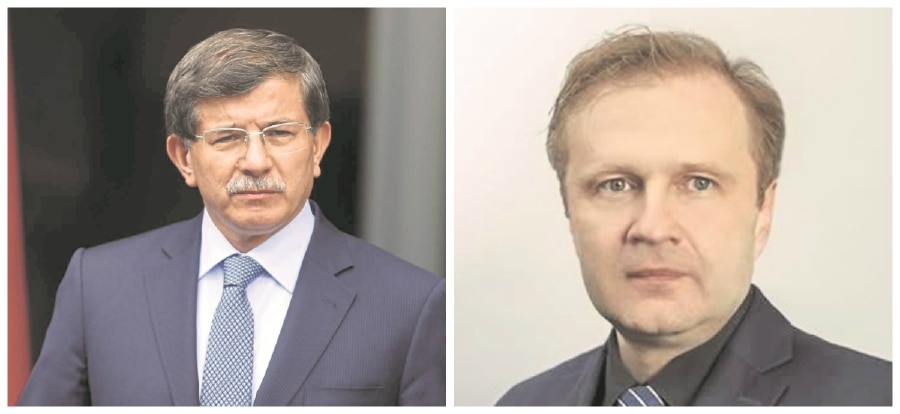Lessons gleaned from the Sarajevo Business Forum
Emeritus Professor Tan Sri Dato' Dzulkifli Abdul Razak
Opinion - The New Strait Time
April 19, 2019

Former Turkish prime minister Dr Ahmet Davutoglu (left) and Bosna Bank International chief executive officer Amer Bukvic continue to play significant roles in the evolution of the Sarajevo Business Forum
SOME magical event took place in Sarajevo last week. It was the 10th anniversary of the Sarajevo Business Forum (SBF) that started in 2009, less than a decade after an asymmetrical war was forced onto Bosnia and its people.
Indeed it could be argued that SBF is “inspired” by the tragic incidences that spurred a number of lessons, setting many Bosnians to thinking very hard about their future, if not survival.
One of them is the architect of SBF, Amer Bukvic — an International Islamic University Malaysia alumni and now CEO of Bosna Bank International, who described the forum as an “emotional project” because it took many years to realise the event.
Last week as he spoke at the welcoming session of the 10th SBF at the National Parliament of Bosnia Herzegovina, one could clearly sense the proud moment that SBF bestowed on the nation and region.
It was the largest thus far, commanding the participation of more than 300 projects with over 1,000 participants attending. In addition, 50 countries were represented and spanned beyond Southeast Europe.
Not to be forgotten were the number of dignitaries who were actively involved. One of them was Tun Dr Mahathir Mohamad, a founding patron of SBF, then and now as the prime minister of Malaysia.
Dr Mahathir in his address was clearly excited to be with SBF again in his present capacity. He urged SBF to seek common purpose and to work together as one region and one economy. This is so as to hedge the current situation and the crossroads ahead.
Another person who appeared outstanding in the evolution of SBF was former prime minister of Turkey, Dr Ahmet Davutoglu. Being a professor to Amer, his influence could not be underestimated as he recounted what could be done to counter the potential challenges ahead.
Like Dr Mahathir, regional reintegration with common policy and shared values covering multiculturalism, multireligious and ethnicity seems to be his strategy to move forward.
In all, SBF for the 10th year exhibited a high level of maturity and readiness which was clearly evident through the panel discussions held. Apart from the usual subjects of leadership roles and issues of brain drain/gain, sustainable development (SD) featured well as the “new” agenda that straddles between the two.
This means that the leaders of tomorrow must be conversant about SD which could also be a factor in reducing brain drain, if not to improve brain gain. What is apparent is that “unsustainable” (counterpoint to SD) development could encourage brain drain because of the natural tendencies to seek “greener” (pun intended) pastures when all seems to be beyond reach (unequitable prosperity).
Thus, it has direct implications to the goals of SD in creating an ecosystem that is fair, just and balanced. This is what escapes many businesses today, that look at SD as another “incremental” tool rather than a “transformational” model that changes everything before it has any meaningful impact on sustainability.
For example, the language used is no longer about a linear growth economy but that of a circular one; “eco” in the conventional economy is all things “ecological” as a counterweight to economic imbalances of the past in safeguarding the one and only planet and all of its inhabitants to co-exist in a harmonious balance.
This means that the leadership role in an heirachical pyramidal structure is not sustainable due to its rigidity and top-down tendencies. Instead it has to be organisationally flatter and networked like that of nature where it is more connected at the roots and thus truly borderless and sustainable. Are businesses moving in this direction as a global trend in adopting or adapting to SD?
In other words, SBF 10 has opened up new vistas to thinking afresh, instead of merely tinkering with the same old ways to jump start. To quote Amer in his opening remarks: “History will be judging us” — is indeed apt as a reminder that the SBF has clearly raised the stakes for all those present at the forum with clear signals that the days ahead are extremely bright.
Also, not to lose focus over is the “brightened” common path to the collective future, and not to be gullible over the many distractions that take away the higher sense of purpose, blinded by the same bright lights that veil the vision ahead.
Issues like the fourth industrial revolution could be just one if artificial intelligence is allowed to overshadow and reign over human primodial intelligence (the fitrah) beyond the technological “singularity” as it stands today.
In summary, the next SBFs will face even more difficult tasks ahead in “humanising” technology through business unusual, if history is indeed to judge us favourably. Therein lies the vital lesson of magic of the recent SBF.
The writer, an NST columnist for more than 20 years, is International Islamic University Malaysia rector
